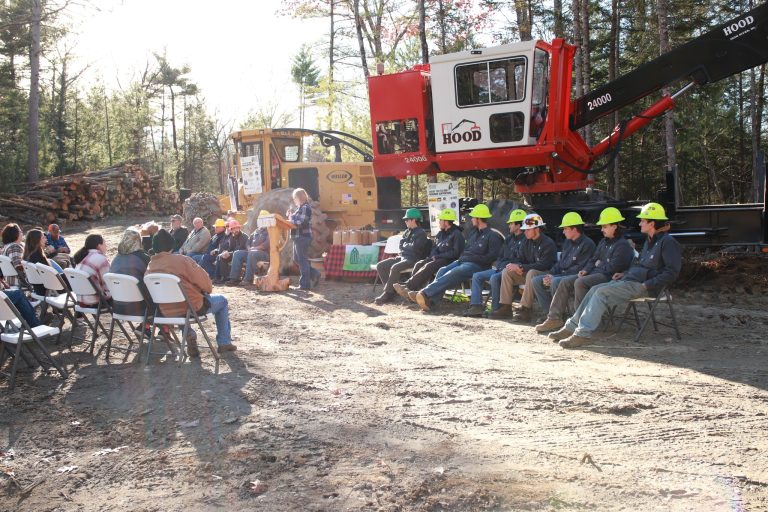PLC addresses effect of planned Sappi Westbrook shutdowns on state logging industry
WESTBROOK – The Professional Logging Contractors of Maine (PLC) today said Sappi North America’s announcement that it will permanently shut down the #9 paper machine and the majority of its biomass energy complex at its Westbrook Mill will worsen an ongoing crisis for Maine loggers and forest truckers.
Sappi today announced the decision to shutter the facilities by year’s end. Declines in demand for paper and other wood fiber based products caused by the COVID-19 pandemic have prompted similar shutdowns, slowdowns, and closures across the globe.
In Maine, the announcement is only the latest blow to the state’s logging industry, which, as a result of COVID 19, has seen declining demand for wood from mills across the board, and low prices and quotas driven by that lack of demand. Compounding this blow is the loss of the Pixelle Specialty Solutions pulp mill in Jay Maine as the result of an explosion in April.
“Time is running out for many Maine logging and trucking contractors, and if we lose these companies many will not be coming back no matter what happens to markets in the future,” PLC Executive Director Dana Doran said. “Congress and the Trump administration need to act swiftly to support relief for the nation’s logging and forest trucking companies while those companies are still viable.”
This spring the PLC led early efforts to mobilize a national effort to secure federal relief for loggers similar to that already earmarked for the fishing and farming industries. That effort is now centered around a proposal put forth by the 34 member associations of the American Loggers Council (ALC) which would reserve $2.5 billion to provide a loan program for contractors that harvested/delivered wood to various mills across the country in 2019.
If it is approved by Congress and President Trump, contractors would be able to apply for low-interest bridge loans through the U.S. Department of Agriculture to assist them with their ability to continue business operations for the next twelve months while markets attempt to recover. If a company that applies for and receives the funding can prove that their revenues or volume delivered are down 10% or more from 2019, the funds will be treated as a grant and forgiven. If company revenues are down less than 10% than what they declared in 2019, the funds will become a low interest loan and need to be repaid.
The proposal is expected to be part of the relief measures considered by Congress when it returns to session later this month.
Westbrook is a vital market for many Maine logging and forest trucking companies in the southern half of Maine, consuming some 275,000 tons of woody biomass per year, representing about $7.4 million in revenue to logging companies.
Some of the paper production previously handled by the #9 machine will shift to Sappi’s Somerset Mill in Skowhegan according to Sappi’s announcement, but the loss of the biomass energy market represented by Westbrook will remove one of the last outlets for chipped low grade wood, tree tops, and limbs left in the state following shutdowns and slowdowns at biomass facilities throughout Maine in recent years.
A survey of the membership of the Professional Logging Contractors of Maine (PLC) conducted in May 2020 on the impact of COVID-19 on Maine’s logging and forest trucking companies revealed 88 percent of respondents had been negatively impacted by the pandemic. Since then, the situation has worsened, and currently many members are operating at approximately half capacity, suffering significant revenue losses and contemplating shutdown and layoffs by August – normally a peak harvesting month.
“Westbrook is just the latest reminder that our state’s logging industry and the rural communities that rely on it are all now at risk due to factors beyond their control,” Doran said. “This is an industry that hates to ask for help and which rarely receives it, but our leaders in Washington need to understand it is an industry vital to our economy and future, and both will suffer if we do not act to protect it.”
“The PLC would also like to express our support for the Sappi workers who will be affected by the shutdowns, and to thank Sappi North America for their continued investment and commitment in Maine and the wood markets loggers in our state depend on. We are in this crisis together,” Doran added.
Maine’s loggers are a vital part of the state’s forest products sector, which is worth an estimated $7.7 billion annually.
Founded in 1995 with a handful of members who were concerned about the future of the industry, the PLC has grown steadily to become a statewide trade association which provides independent logging contractors and truckers a voice in the rapidly changing forest products industry. Board membership consists of only loggers, making it an organization that is run by loggers on behalf of loggers.

